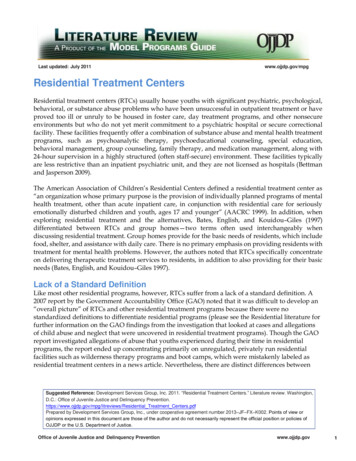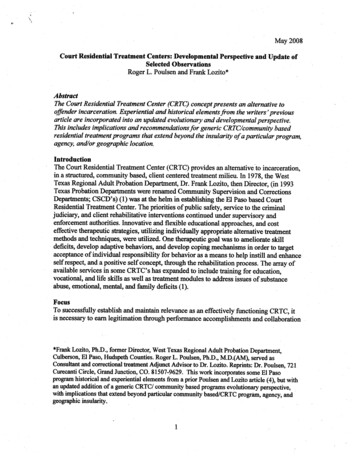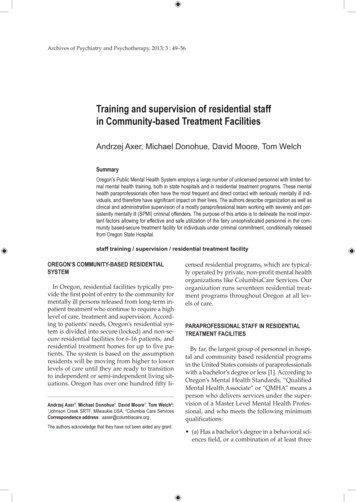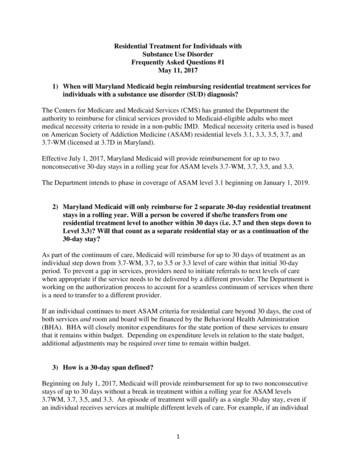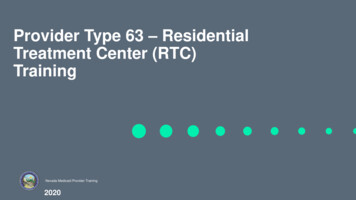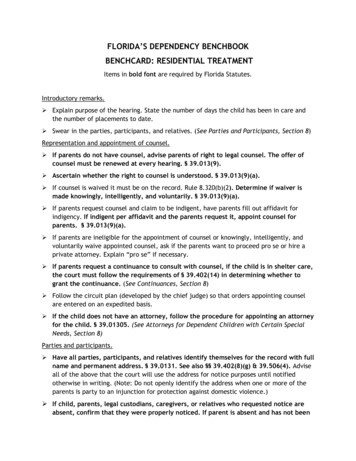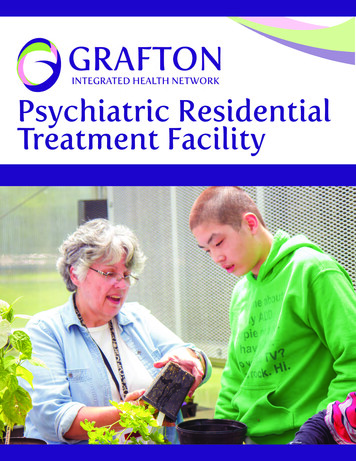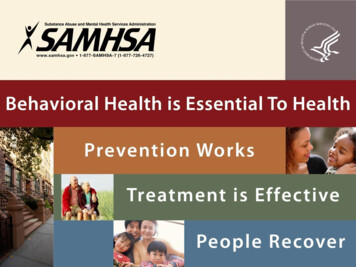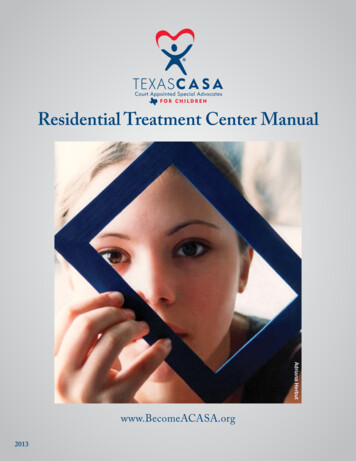
Transcription
Residential Treatment Center ManualAdriana Herbutwww.BecomeACASA.org2013
CJAChildren’s Justice Acta TEXAS CENTER FOR THE JUDICIARY grant programThis manual was made possible by funding provided by the Supreme Court of TexasPermanent Judicial Commission for Children, Youth and Families andChildren’s Justice Act, a Texas Center for the Judiciary Grant Program.
This manual is a beginning, a gathering of information to share and to prompt more collaborative work toimprove the lives and outcomes of children whose journey in our child protection system has placed themin residential care settings. This manual serves no purpose unless it is used by what we affectionately call,“Fierce Advocates”!We know the children placed in RTC’s have experienced trauma – some acute, some chronic, many haveexperienced both. We know that these traumatic experiences have occurred during different developmental stages, greatly impacting the child, in ways unseen to us at first. And we all acknowledge that ourintervention can also be another source of trauma, grief and loss for these children.In our child protection system, it is the children with the highest needs – intensive needs – that findthemselves in residential care. Often these children have been in care for a long time. Many have haddozens of placements and are greatly impacted by the instability which causes them to lose trust and hope.It is these children that need our very best - our best understanding, our best response and our “Fiercest Advocacy.”So, what does it mean – our “best understanding?” Usually it is a child’s behaviors that require thehighly restrictive settings of residential care. What is the root cause or causes of these behaviors? Whatdo we need to know and understand about what has caused or continues to cause behaviors that make it“unsafe” or “difficult” or even “impossible?” for a child to self regulate, follow rules and succeed in a familyhome and public school?And what does it mean to provide our “best response?” Would this mean providing ample time andattention in terms of resources that provide for the child in a culturally sensitive, skillfully trained, traumainformed, consistent, and committed manner?And what would a “fierce advocate” for these children do? Would this advocate let barriers stop them?Would this advocate get to know the child – really know the child? Would this advocate let the childknow that someone really does care? Would this advocate help this child have their voice heard? Wouldthis advocate seek to become informed? Would this advocate ask questions, lot of questions, and push thesystem and demand of the system - accountability and high standards and adherence to policies and laws.And if new laws or policies were needed, would this advocate speak up to demand better? And would thisadvocate never, never, ever give up, but always believe that for every child there is safety, trust, healing, loveand a family – a forever family.The information in this manual should help inform and send you in the direction of supporting childrenthat are placed in RTC’s. We at Texas CASA humbly ask that you join us in improving the outcome ofchildren. Hopefully, you understand the need for “Fierce Advocacy”, the question for you now is willyou become one?Texas Casa Staff
TA B LE O F CO N T EN T SI. About Residential Treatment Facilities . . . . . . . . . . . . . . . . . . . . . . .1II. Identifying and Meeting Needs in RTC’s. . . . . . . . . . . . . . . . . . . .29a. Physical and Behavioral Health. . . . . . . . . . . . . . . . . . . . . . . . . .31b. Education . . . . . . . . . . . . . . . . . . . . . . . . . . . . . . . . . . . . . . . . . .53c. Permanency and Engagement . . . . . . . . . . . . . . . . . . . . . . . . . . .63d. Older Youth. . . . . . . . . . . . . . . . . . . . . . . . . . . . . . . . . . . . . . . . .73III. Advocacy . . . . . . . . . . . . . . . . . . . . . . . . . . . . . . . . . . . . . . . . . . . . .85IV. Resources . . . . . . . . . . . . . . . . . . . . . . . . . . . . . . . . . . . . . . . . . . . . 121Texas CASA Residential Treatment Center (RTC) Manuali
About ResidentialTreatment Centers“Our lives begin to endthe day we become silentabout things that matter” Martin Luther King, Jr.Texas CASA Residential Treatment Center (RTC) Manual1
Texas CASA Residential Treatment Center (RTC) ManualW H AT I S AR E S I D EN T I A L T R E AT M EN T C EN T ER ?Basic InformationGeneral Residential Operation (GRO) A residential child-care operation that provides child care for 13or more children or young adults. The care may include treatment services and/or programmatic services.These operations include formerly titled emergency shelters, operations providing basic child care, operationsserving children with mental retardation, and halfway houses.Residential Treatment Center (RTC) A general residential operation for 13 or more children or youngadults that exclusively provides treatment services for children with emotional disorders.Minimum Standards for Residential Treatment Centers and all child care facilities can be found on theDFPS website under Child Care Licensing – Standards and Regulations. A copy of these MinimumStandards is on page 111.What policies should the RTC have? Visitation rights between the child and family members and the child and friends; The child’s rights to correspond by mail with family members and friends, including any policiesregarding mail restrictions and receipt of electronic mail; The child’s rights to correspond by telephone with family members and friends; The child’s rights to receive and give gifts to family, friends, employees, or other children in care,including any restrictions on gifts; Personal possessions a child is or is not allowed to have; Emergency behavior intervention techniques if the use of emergency behavior intervention ispermitted. If its use is not permitted, the RTC must have a policy disallowing its use; Discipline policies, including techniques and methods for ensuring the appropriateness of disciplinetechniques used with a child. Any religious program or activity that the RTC offers and whether participation is required. The plans for meeting the educational needs of each child, including the RTC’s educational programand required participation by children. When trips with caregivers away from the operation are allowed and what protocols will be used; Program expectations and rules that apply to all children; A general daily schedule for routine activities for children in care;3
Texas CASA Residential Treatment Center (RTC) Manual Child grievance procedures; Procedures for routine and emergency diagnosis and treatment of medical and dental problems; A plan for providing health-care services to a child with primary medical needs; Weapons, firearms, explosive materials, and projectiles Written plans and procedures for handling disasters and emergencies, such as fire, severe weather, andtransportation emergencies.Diana Myrndorff4
Texas CASA Residential Treatment Center (RTC) ManualTexas Residential Treatment Centers5
Texas CASA Residential Treatment Center (RTC) ManualResidential Treatment isFort BendHarrisFort isHarrisHarrisHarrisHarrisFort BendHarrisFort aBexarBexarBexarKerrKerrBexarComalComalKendallSan PatricioResource NameChildren’s Hope Residential ServicesChildren’s Hope Residential ServicesChildren’s Hope Residential ServicesAutistic Treatment Center, IncBright Star Youth AcademyIndependence FarmNew Encounters Residential TreatmentNorth Fork Educational CenterNorth Fork Educational (IPTP Only)**Thompson’s Residential TreatmentAzleway Boy’s RanchEast Texas Open Door RTCWillow Bend CenterWillow Bend (IPTP Only)Youth And Family Enrichment CenterNacogdoches Boy’s RanchSinclair Children’s CenterA Fresh Start Treatment CenterA New Day FoundationCarter’s Kids Residential TreatmentCenter For Success and IndependenceDepelchin Children’s CenterDepelchin Childrens(IPTP Only)Embracing Destiny FoundationFive Oaks Achievement CenterFive Oaks Achievement (IPTP Only)Good Shepherd Residential TreatmentGuardian Angels I ResidentialHave Haven Inc.Hearts With Hope FoundationHold My Hand Residential TreatmentHouston Serenity PlaceHouston Serenity Place, Inc.Houston Wee Care Shelter Inc.Krause Children’s ResidentialL’Amor Village RTCNew Hope Youth CenterPositive Steps Inc.Shamar Hope Haven ResidentialSheltering HarbourUnity Children’s Home RTCAvalon Center Inc.Brookhaven Youth RanchEveryday Life Inc.Helping Hand Home For ChildrenHMIH Cedar Crest, LLCNew Horizons Ranch ResidentialPegasus Schools, Inc.The Burke Foundation-PathfindersWhispering Hills Achievement CenterWhispering Hills (IPTP)Autistic Treatment CenterDevereux-VictoriaHabilitative Homes Inc.Hector Garza Residential TreatmentHector Garza Center (IPTP)Hill Country Youth Ranch ResidentialHill Country Youth (IPTP Only)KCI Servants Heart ResidentialNew Life Children’s Treatment CenterNew Life Children’s Treatment Center (IPTP)Roy Maas Youth AlternativesShoreline Inc.**IPTP (Providing Intensive Psychiatric Transition Program Services)6Address1313 W Washington St500 West Ave2402 Canyon Lake Dr10503 Metric Dr2519 Oak Lawn Avenue2715 Liberty Dr4121 FM 6373001 Elm Grove Rd3001 Elm Grove Rd1995 FM 1564 E15892 County Road 26411& 413 West Burleson2902 Highway 31 E2902 Hwy 31 E14023 Hwy 155 S7245 Fm 1275207 N Nellius St7809 Winship St17202 Garden Creek Dr1203 Lark Ln3722 Pinemont Dr710 S 7th St123 Shepherd17803 Woodbark Rd7674 Pechacek Rd7674 Pechacek Rd23538 Coons Rd9530 W Montgomery Rd14054 Ambrose St17718 August Meadows Ln7722 Glenvista St6703 Sealey Street6509 Morrow St28915 S Plum Creek Dr25752 Kingsland Blvd16540 Kuykendahl Rd4111 Brandt Rd2701 Rosedale St2719 Truxillo St17803 W Strack Dr2111 River Valley Dr480 Highway 75467 Rogers Hill Rd6955 Broach Rd3804 Avenue B3500 S IH 35850 FM 574 W896 Robin Ranch Rd20800 FM 150 W4110 FM 6094110 Fm 60916111 Nacogdoches Rd120 David Wade9019 Old Sky Hbr620 E Afton Oaks Blvd620 E Afton Oaks Blvd3522 Junction Highway3522 Junction Hwy4040 High Ridge Cir650 Scarbourough650 Scarborough121 Old San Antonio Rd1220 Gregory HoustonRichmondHoustonSpringNew UlmNew twoodFlatoniaFlatoniaSan AntonioVictoriaSan AntonioSan AntonioSan AntonioIngramIngramSan AntonioCanyon LakeCanyon LakeBoerneTaftZip 806) 897-9735(806) 897-9735(806) 762-5782(214) 221-4405(214) 780-0969(903) 874-2377(903) 874-1577(972) 412-2444(972) 412-2444(903) 883-5437(903) 566-6827(903) 935-2099(903) 596-8900(903) 596-8900(903) 534-0414(936) 569-0293(409) 283-6800(713) 635-1081(281) 257-1218(281) 239-6999(713) 426-4545(281) 342-4906(281) 342-4906(281) 251-4857(979) 992-3791(979) 992-3791(281) 374-0777(281) 447-1812(832) 667-8851(281) 376-0320(713) 645-0042(713) 691-5453(713) 691-5572(281) 363-4020(281) 392-7505(281) 586-9708(281) 344-8050(713) 522-0559(713) 942-8822(281) 379-4578(281) 355-0716(254) 859-5990(254) 829-1920(979) 589-1885(512) 459-3353(254) 939-2100(325) 938-5518(512) 376-2101(512) 858-4258(361) 865-3083(361) 865-3083(210) 590-2107(361) 575-8271(210) 623-5419(210) 568-8600(210) 568-8600(830) 367-2131(830) 367-2131(210) 212-2500(830) 964-4390(830) 964-4390(830) 816-2425(361) 528-3356
Texas CASA Residential Treatment Center (RTC) ManualGeneral Residential Operations (Providing Basic Child ravisWilliamsonTravisSan allBexarComalBexarComalTom GreenEl PasoHidalgoBeeCameronResource NameCal Farley’s Boys RanchChildren’s HomeChildrens Home Of LubbockHigh Plains Children’s HomeTexas Boys RanchNew Horizons Audrey Grace HouseSweeten Home For Children Inc.ACH Child And Family ServicesBoles Children’s Home, Inc.Cumberland Presbyterian Children’s HomeJonathan’s PlaceMethodist Children’s HomePresbyterian Children’s Homes & ServicesSherwood-Myrtie Foster Home For ChildrenAzleway Valley ViewChildren’s Village And FamilyEast Texas Open Door IncBoys Haven Of AmericaGirls HavenBoys & Girls Country Of HoustonBoys & Girls HarborBrazoria County Youth HomesEmbracing Destiny FoundationGulf Coast Trades CenterHands Of HealingHearts With Hope FoundationThe Jim H. Green Kidz HarborAustin Children’s ShelterCasa Esperanza Inc DBA Hope HouseCentral Texas Children’s HomeCherokee Home For ChildrenLifeworks Transitional LivingMethodist Children’s HomeMethodist Children’s Home BoysPost Country CareTexas Baptist Children’s HomeThe Settlement Club HomeBCHM San Antonio CampusBluebonnet Youth RanchBoysville IncConnections Individual and Family ServicesGeorge Gervin Youth CenterHill Country Youth RanchMission Road Developmental CenterMission Road Developmental CenterNew Beginnings Children’s HomePathways 3H Youth RanchRoy Maas Youth AlternativeSeton HomeSt Judes Ranch For ChildrenSt Peter - St Joseph ChildrensSt. Jude’s Ranch For ChildrenConcho Valley Home For GirlsLee Beulah Moor Children’s HomeRio Grande Children’s HomeSouth Texas Children’s HomeSunny Glen Childrens HomeAddress8 Julian Bivins Blvd3400 Bowie St4404 Idalou Rd11461 S Western St4810 N County Road 2800598 Medical Dr2301 C R 1351424 Summit Ave7065 Love909 Greenlee St6065 Duck Creek Dr300 Brookside Rd300 Brookside Rd1779 N Graham St15892 County Road 263659 FM 724414 W Burleson St3655 N Major Dr3380 Fannin St18806 Roberts Rd514 Bayridge Rd3315 Fm 523 Rd8014 Forest Breeze Ln143 Forest Service Rd. 233105 W Pearce St3407 Spring Creek Dr638 Harbor Dr4800 Manor Rd1705 County Road 2851925 Crane RdHwy 16 N4606 Connelly St1111 Herring Ave1439 Methodist Ranch Rd5741 Elm Grove Rd1101 N Mays St1600 Payton Gin Rd7404 W US Highway 904652 US Highway 77a S8555 E Loop 1604 N705 Comal Street511 Yucca St Apt 23522 Junction Highway8706 Mission Road8706 Mission Rd400 County Road 3821110 3H Youth Ranch Cir Nw121 Old San Antonio Rd1115 Mission Rd1400 Ridge Creek Ln919 Mission Rd652 Old Bear Creek Rd404 Preusser St1100 E Cliff Dr3780 N Bentsen Palm Dr9243 FM 26172385 W Expressway 83CityBoys dFort rgans PointOyster CreekSpringNew WaverlyBaytownSpringLiverpoolAustinLiberty HillBudaCherokeeAustinWacoWacoBeltonRound RockAustinSan AntonioYoakumConverseNew BraunfelsSan AntonioIngramSan AntonioSan AntonioSan AntonioMountain HomeBoerneSan AntonioBulverdeSan AntonioNew BraunfelsSan AngeloEl PasoMissionPettusSan BenitoZip 9902-462578574-82077814678586-7831Phone(806) 534-2211(806) 352-5771(806) 762-0481(806) 622-2272(806) 747-3187(325) 437-2535(325) 641-0632(817) 886-7120(903) 224-4931(940) 382-5112(972) 303-5303(469) 548-3400(972) 937-1319(254) 968-2143(903) 566-8444(903) 592-3421(903) 935-2099(409) 866-2400(409) 832-6223(281) 351-4976(281) 471-9622(979) 233-7281(281) 251-4857(936) 344-6677(281) 424-2000(281) 651-1207(281) 581-2505(512) 499-0090(512) 515-6889(512) 243-1386(325) 622-4201(512) 458-2704(254) 753-0181(254) 799-2434(254) 939-7322(512) 255-3682(512) 836-2150(210) 674-3010(361) 293-3546(210) 659-1901(830) 620-0214(210) 532-3948(830) 367-2131(210) 924-9265(210) 924-9265(210) 892-2915(830) 549-2457(830) 816-2425(210) 533-3504(830) 885-7494(210) 533-1203(830) 629-0659(325) 655-3821(915) 544-8777(956) 585-4847(361) 375-2101(956) 399-53567
Texas CASA Residential Treatment Center (RTC) ManualCO M M O N T ER M S & AC RO N Y M SIndividual Treatment Plan (ITP): Every child in a residential treatment center has an ITP. The ITPincludes: The child’s diagnosis or diagnoses Strength’s and assets of the child Goals, methods and expected outcome Evaluation of the child’s progress towards treatment goals Needed services and the staff responsible for them The child’s length of stay in the program A discharge planTreatment Plan Review: A treatment plan review should occur at least every three months. Participants inthis staffing may consist of RTC staff, CPS staff, therapists, teachers, surrogate parent, CASA, Attorney adlitem, and parents or kin. Advocates are encouraged to attend these staffings.Incident Report: RTCs are required to provide written documentation on all critical incidents involvingchildren/youth. If you are made aware of a critical incident, please ask to review the incident report. Beloware examples of critical incidents: Abduction – a child/youth taken from the facility by unauthorized individual or individuals Alleged abuse or Neglect – RTC staff or contracted professional or any person in with the child/youth is alleged to have physically, sexually or verbally abused the child/youth Arrest of child/youth – child/youth is arrested Assault by child/youth – a willful and malicious attack by a child/youth Assault by youth on staff – child/youth attacked staff and the assault may or may not require medicalattention Confinement – secure detainment of child/youth for the purpose of control or discipline Contraband – any item possessed by an individual or found within the facility that is illegal by lawor prohibited by the facility Emergency Medical treatment – child/youth has been injured or has suffered an illness that requiresemergency medical attention Emergency use of psychotropic medications – one time dose of a psychotropic medication in theevent of a psychiatric emergency when all other measures have been unlikely to prevent the child/youth from imminent harm to self and / or others8
Texas CASA Residential Treatment Center (RTC) Manual Major event at RTC (i.e., riot, fire, flood, etc.) Physical restraint – involuntary immobilization of an individual without the use of mechanicaldevices. This is includes escorts where the child/youth is not allowed to move freely Medication Error- medication is not administered according to the prescribing provider and /oraccording to the RTC policies and procedures Mental Health Crisis – child/youth has engaged in or experienced self-injurious behavior, suicidalideation or behavior, homicidal ideation or behavior or acute psychotic episode Property damaged - property that is lost, stolen, missing or damaged with or without intent Runaway – a child/youth is away without consent of the RTC, and or legal gurdaian Search – contraband is found in the facility or on a child/youth during a pat down Seclusion – confinement of an individual alone in a locked room or egress preventedDischarge Plan: How long a child remains in an RTC should be determined by the child’s progress intreatment. A discharge plan can include: Continuing educational planning Continuing physical and behavioral health care planning Recreation, activities and for older youth transitional living planning Assessment of risk factors and a crisis planSome Diagnostic acronyms to know: ADD – Attention Deficit Disorder ADHD – Attention Deficit with Hyperactivity Disorder ASD – Autism Spectrum Disorder BD – Behavioral Disorder BP – Bipolar Disorder BPD – Borderline personality Disorder or bipolar disorder CD – Conduct Disorder *DSM – Diagnostic and Statistical Manual of Mental Disorders by the American PsychiatricAssociation ED – Emotionally Disturbed or Eating Disorder FAS – Fetal alcohol syndrome AD – Anxiety Disorder9
Texas CASA Residential Treatment Center (RTC) Manual LD – Learning Disorder MDD – Major Depressive Disorder OCDC – Obsessive Compulsive Disorder PTSD – Post Traumatic Stress Disorder RAD – Reactive Attachment Disorder SAD – Separation Anxiety Disorder SMI – Severe Mental IllnessOther acronyms ADA –Americans Disability Act ARD – Admission, Review, and Dismissal BIP – Behavior Intervention Plan BMP – Behavioral Management Plan CBT – Cognitive Behavioral Therapy DD- Development Disorder DFPS – Department of Family and Protective Services DX – Diagnosis FAPE – Free Appropriate Public Education IDEA – Individual with Disabilities Education Act IEP – Individual Education Plan NAMI – National Alliance on Mental illness PRN – Prescribed for use as needed R/O – Rule out SA – Substance Abuse SASS –Screening Assessment Support Services SEP – Special Education Plan10
Texas CASA Residential Treatment Center (RTC) ManualR E S I D EN T I A L C H I LD C A R ECO N T R AC T I N F O R M AT I O NAccessing information about the Residential Child Care Contracts (RCC) Division and the ResidentialChild Care Contract can be found at the following link:http://www.dfps.state.tx.us/PCS/Residential Contracts/default.aspThe Residential Contracts Web site includes important helpful information: Residential Contract, Executive Summary, Forms, and Sample Letters (a copy of the current fiscalyear contract, attachments and a summary of what changed from last year)http://www.dfps.state.tx.us/PCS/Residential Contracts/contract forms.asp RCC Staff Contact Information (list of current residential contracts staff )http://www.dfps.state.tx.us/PCS/Residential Contracts/contract managers.asp Applicant’s Guide to Contracting (a good overview of Licensing, Contracts, CPS, YFT and STARHealth) http://www.dfps.state.tx.us/documents/PCS/RCC Contracting Guide.pdf List of Active Contracts (updated ial Contracts/active contracts.asp Helpful Links (Guides for certain types of services, trainings, resources, and requirements) http://www.dfps.state.tx.us/PCS/Residential Contracts/contract resources.asp Email address for contacting the Residential Contracts divisionResidential Contracts@dfps.state.tx.usAccess to Children.Section 33. of the Residential Contract clarifies the access to children granted by the Texas Family Codefor CASA, guardians ad litem and attorneys ad litem. In Fiscal Year 2012, DFPS added the following tothe Residential Contract:33. Access to Children. The Contractor will, at all times, permit access to all Children placed by the Departmentin the care of the Contractor by properly identified individuals appointed by a court of competent jurisdiction(Volunteer or Court Appointed Special Advocates (CASA), guardians ad litem, and attorneys ad litem).A) All parties will exercise their right of access in a reasonable manner and attempt to plan and coordinatesuch visits in cooperation with the Contractor and in a manner that minimizes disruption of the careof the Children placed with the Contractor.B) In order to assess that an individual is appointed by a court of competent jurisdiction, a Contractoror Caregiver should:i. If such individual is an employee of the CASA, review for a valid court order; and11
Texas CASA Residential Treatment Center (RTC) Manualii. If such individual is a CASA volunteer, review for a valid court order and a notification letter ofvolunteer assignment and acceptance, that clarifies the individual’s appointment to the Child; oriii. Review that the individual is named on the Child’s Contact List.C) If Contractor or Caregiver cannot readily determine the identity or authority of an individualappointed by a court of competent jurisdiction, then the Contractor or Caregiver should obtainapproval from the Child’s Caseworker or Chain of Command prior to granting the individual accessto the Child.School Requirements.School-age children in the conservatorship of DFPS should be enrolled in an accredited Texas Public Schoolwithin three school days of placement, unless an exception has been granted by the Child’s Caseworker.In addition, if a Child has to withdraw from a Public School due to a change in placement that results inthe Child being discharged, the discharging Residential Contractor must notify the Public School withinthree school days of this discharge.Education Portfolio.The caseworker creates an Education Portfolio for each school-age child in DFPS conservatorship. Theportfolio contains the child’s current academic and psychological assessments, as well as immunizationrecords, and copies of report cards. For children with special needs, the portfolio also includes notes fromAdmission, Review, and Dismissal (ARD) meetings.Contract Section 15 B) i. identifies all items that must be updated in the Education Portfolio:i. School enrollment documentation: Birth certificate, Social Security number, Immunizations, andwithdrawal notice from the last school;ii. Special education documentation: Admission, Review & Dismissal (ARD) team meeting notes,Individual Education Plan (IEP), Documents related to Section 504 of the Rehabilitation Act of1973 regarding reasonable accommodations, Full Individual Evaluation and/or other diagnosticassessments;iii. Report cards, progress reports, and/or IEP progress reports;iv. Transcripts;v. Standardized test results;vi. Referrals, notices, or correspondences; andvii. School pictures.Preparation for Adult Living (PAL) Activities and Transition Planning.Residential Contractors are expected to participate in and provide transportation to Transition Planningand PAL activities.12
Texas CASA Residential Treatment Center (RTC) ManualPAL services include benefits and services provided to Children in DFPS-paid Substitute Care who areage 16 and older and likely to remain in foster care until at least 18, who can qualify for services up to their21st birthday and includes:A) Casey Life Skills Assessment to assess strengths and needs in life skills;B) Life Skills training in core areas including financial management;C) Job readiness and life decisions/responsibility;D) Educational/vocational services;E) Transitional Living Allowance (TLA) up to 1000 (distributed in increments up to 500 per monthfor children who participate in PAL Life Skills training, to help children with initial start-up costsin adult living);F) After Care Room and Board (ACRB) assistance, based on need, up to 500 per month for rent,utility deposits, food, etc. (not to exceed 3000 of accumulated payments per Child);G) Case management to help Children with self-sufficiency planning and resource coordination;H) Teen conferences;I) Leadership development activities; andJ) Additional supportive services, based on need and availability of funds, such as mentoring servicesand driver’s education.DFPS policy requires the development of a Transition Plan (Form 2500) for a youth who turns 16 while inDFPS care and also requires a transition plan meeting within 90 days of a youth turning 18 in care.As per contract section 29 G), Residential Contractors have an important role in coordinating with CPS forChildren 16 years of age and older regarding:i. The use of the CPS Transition Plan, Form 2500, as appropriate, owFile.aspx?Name 2500.docii. Maintaining a copy of the Voluntary Extended Foster Care Agreement Form 2540 and TrialIndependence: Ability to Return for Extended Foster Care Form 2532 in the record;iii. The provision of information available athttp://www.dfps.state.tx.us/Child Protection/Transitional Living/default.asp related to:a. Aftercare services, benefits and provider contacts;b. Educational Supports, Services and Benefits;c. Extended Care and Return for Extended Foster Care information;d. Preparation for Adult Living (PAL) services;e. Texas Foster Care Handbook for Youth;f. Transitional Medicaid and STAR Health;13
Texas CASA Residential Treatment Center (RTC) Manualg. Information related to the Child’s Special Immigrant Juvenile Status, if applicable; andh. Other region-specific services available.iv. The provision of information about Transition Service Centers available under the “contacts link”at: http://www.dfps.state.tx.us/txyouth/default.asp; andv. The Contractor shall support and facilitate computer access required for job search activities,career research, Texas Youth Connection and approved social media.Driver License.Senate Bill 218, enacted through the 82nd Regular Legislative session, resulted in the waiver of driverlicense fees for youth in the temporary or permanent managing conservatorship of the Texas Departmentof Family and Protective Services (DFPS) and for young adults at least 18 years of age,
Texas CASA Residential Treatment Center (RTC) Manual 4 Child grievance procedures; Procedures for routine and emergency diagnosis and treatment of medical and dental problems; A plan for providing health-care services to a child with primary medical needs; Weapons, fi rearms, explosive materials, and projectiles Written plans and procedures for handling disasters and emergencies, such as fi re .
